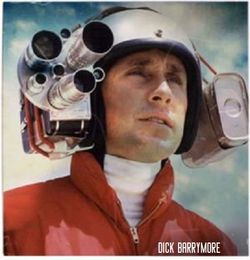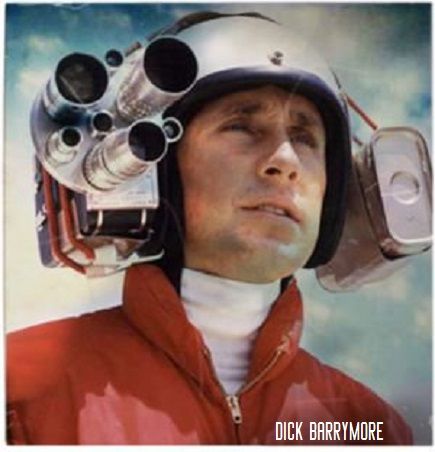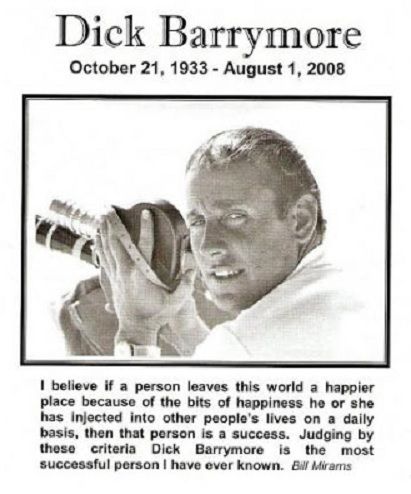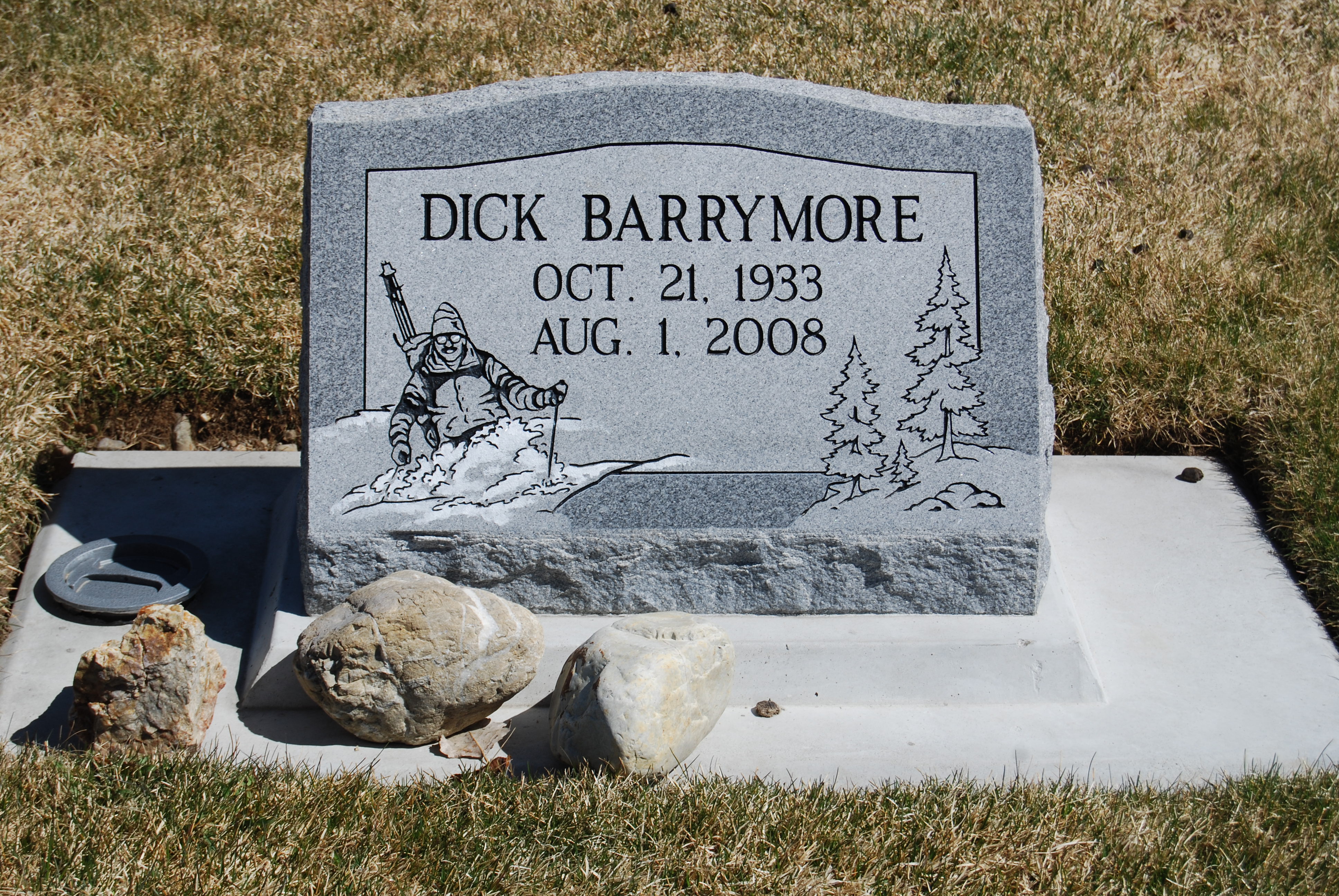He began his career as a ski filmmaker at the 1960 Winter Olympics in Squaw Valley, California, and spent the next three decades traveling from continent to continent. He rarely had a script in mind for his films. He took things as they came and was a master of improvisation.
Best known for his action ski films, Barrymore was first and foremost a man who loved to travel and enjoyed people. He developed the Cabo Pulmo Beach Resort in Mexico, which was a lifelong dream.
"I'm basically a travelogue teller and I just relate the story to skiing," Barrymore told the Idaho Mountain Express in a 1978 interview.
Barrymore's films included "The Last of the Ski Bums," "Wild Skis," "The Derby," and "A Bit of Madness." He was an early proponent of freestyle skiing. A ski magazine once described him as a rather delightful lunatic, to which Barrymore replied, "Yeah. Hey, I like that. I agree."
In the United States, Dick Barrymore claims in his memoir Breaking Even to have held the first wet T-shirt contest at Sun Valley, Idaho's Boiler Room Bar in January 1971, as part of a promotion for K2 skis. The contest was promoted as a simple "T-shirt contest" in which airline stewardesses would dance to music wearing K2 promotional T-shirts. However, the first contestant to appear was a professional stripper who danced topless and the amateur contestants responded by drenching their T-shirts before competing. Barrymore held a second "K2 Wet T-Shirt Contest" in the Rusty Nail at Stowe Mountain Resort, Vermont in order to film it, despite the fact that Stowe City Council had passed a resolution banning nudity at the event. He held another promotional contest for K2 on 10 March 1971 at Aspen, Colorado's The Red Onion restaurant and bar, and the contests were featured in a pictorial in the March 1972 issue of Playboy.
Once you watched a Barrymore movie, there was no mistaking his talent behind the camera or ability to tell a story.
"He would hold court at dinner, always entertaining, bringing up the same stories you heard the year before, only the next year you probably found yourself in the stories he told. For him it was the art of the tale." Like a successful restaurateur, Barrymore's success came from his involvement in every aspect of production. He did most of his own filming with hand-held cameras and was the sole editor. He narrated and selected the music. At one time he personally narrated 65 live shows a year in one-night stands around the United States.
He recruited his skiers, not necessarily using the flashiest or most stylized skiers, but rather, in his words, someone who gets an "oh-my-God-Ethel-who-was-that?" kind of response from the audience. Barrymore, one of skiing's great raconteurs, projected his unique personality into each of his films.
Born in 1933 in California, to a Russian Cossack Father who was also a Hollywood actor, Richard Barrymore made his first voyage into filmmaking at 25 with "The Valley of the Lost Tribe," a Hawaiian adventure made with his family and surfing friends. He made $375 from the venture. The trip cost $1,800.
By the late 1970s, Barrymore was so well known that he was invited to ski with the Shah of Iran and his family. He filmed the Shah's wife, Empress Fara Dibba, skiing alongside famous U.S. skiers Suzy Chaffee and Billy Kidd in the Iran hills.
"The Shah paid all our expenses," Barrymore said while promoting his 1978 film "Wild Skis," which featured Iran skiing footage. "He had originally planned to ski with us, but he was busy either starting or stopping World War III so he couldn't make it."
Barrymore wasn't adverse to appearing in his own films though he would never be a John Barrymore type of actor. The ski filmmaker and the famous actor weren't related.
In "Wild Skis," a speed cop for skiers named Buford Billingsley (played by McWilliams) chased runaway skiers on his "ski skipper." Barrymore played the part of Avalanche Al, intent on setting speed records of up to 320 mph while "riding" an avalanche.
His wanderlust always led Barrymore to his next film project. He said, 30 years ago, dreaming on as always, "In the works for the next movie is a take-off on dueling banjos which I'll call dueling skis. I'll film it in Sun Valley, and it will be a classic confrontation between short skis and long skis."
Barrymore is survived by his mother, Blanche Barrymore. She lives at Andora Villa in Ketchum. His brother Douglas passed away in 1987, but Dick's nephew Alexander Barrymore lives in New York City and works there as a photographer.
Dick's sons are Blake Barrymore of Hailey and Cole Barrymore of Cabo Pulmo, Mexico. His first wife and mother of his sons, Sandra Wells, lives in Sunset Beach, Calif.
Blake Barrymore is president of Valley Millworks based in Carey. He and his wife Debbie have two sons, Tai, 16, a Wood River High School student, and 13-year-old Chloe, a Wood River Middle School eighth-grade student.
Cole Barrymore and wife Maribel have two children, Jordan and Marbella. Blake's half-sister Shawna Ward and her husband Eric live in Hailey with their four children.
THE WHITE SEARCH MOVIE: FOC:
He began his career as a ski filmmaker at the 1960 Winter Olympics in Squaw Valley, California, and spent the next three decades traveling from continent to continent. He rarely had a script in mind for his films. He took things as they came and was a master of improvisation.
Best known for his action ski films, Barrymore was first and foremost a man who loved to travel and enjoyed people. He developed the Cabo Pulmo Beach Resort in Mexico, which was a lifelong dream.
"I'm basically a travelogue teller and I just relate the story to skiing," Barrymore told the Idaho Mountain Express in a 1978 interview.
Barrymore's films included "The Last of the Ski Bums," "Wild Skis," "The Derby," and "A Bit of Madness." He was an early proponent of freestyle skiing. A ski magazine once described him as a rather delightful lunatic, to which Barrymore replied, "Yeah. Hey, I like that. I agree."
In the United States, Dick Barrymore claims in his memoir Breaking Even to have held the first wet T-shirt contest at Sun Valley, Idaho's Boiler Room Bar in January 1971, as part of a promotion for K2 skis. The contest was promoted as a simple "T-shirt contest" in which airline stewardesses would dance to music wearing K2 promotional T-shirts. However, the first contestant to appear was a professional stripper who danced topless and the amateur contestants responded by drenching their T-shirts before competing. Barrymore held a second "K2 Wet T-Shirt Contest" in the Rusty Nail at Stowe Mountain Resort, Vermont in order to film it, despite the fact that Stowe City Council had passed a resolution banning nudity at the event. He held another promotional contest for K2 on 10 March 1971 at Aspen, Colorado's The Red Onion restaurant and bar, and the contests were featured in a pictorial in the March 1972 issue of Playboy.
Once you watched a Barrymore movie, there was no mistaking his talent behind the camera or ability to tell a story.
"He would hold court at dinner, always entertaining, bringing up the same stories you heard the year before, only the next year you probably found yourself in the stories he told. For him it was the art of the tale." Like a successful restaurateur, Barrymore's success came from his involvement in every aspect of production. He did most of his own filming with hand-held cameras and was the sole editor. He narrated and selected the music. At one time he personally narrated 65 live shows a year in one-night stands around the United States.
He recruited his skiers, not necessarily using the flashiest or most stylized skiers, but rather, in his words, someone who gets an "oh-my-God-Ethel-who-was-that?" kind of response from the audience. Barrymore, one of skiing's great raconteurs, projected his unique personality into each of his films.
Born in 1933 in California, to a Russian Cossack Father who was also a Hollywood actor, Richard Barrymore made his first voyage into filmmaking at 25 with "The Valley of the Lost Tribe," a Hawaiian adventure made with his family and surfing friends. He made $375 from the venture. The trip cost $1,800.
By the late 1970s, Barrymore was so well known that he was invited to ski with the Shah of Iran and his family. He filmed the Shah's wife, Empress Fara Dibba, skiing alongside famous U.S. skiers Suzy Chaffee and Billy Kidd in the Iran hills.
"The Shah paid all our expenses," Barrymore said while promoting his 1978 film "Wild Skis," which featured Iran skiing footage. "He had originally planned to ski with us, but he was busy either starting or stopping World War III so he couldn't make it."
Barrymore wasn't adverse to appearing in his own films though he would never be a John Barrymore type of actor. The ski filmmaker and the famous actor weren't related.
In "Wild Skis," a speed cop for skiers named Buford Billingsley (played by McWilliams) chased runaway skiers on his "ski skipper." Barrymore played the part of Avalanche Al, intent on setting speed records of up to 320 mph while "riding" an avalanche.
His wanderlust always led Barrymore to his next film project. He said, 30 years ago, dreaming on as always, "In the works for the next movie is a take-off on dueling banjos which I'll call dueling skis. I'll film it in Sun Valley, and it will be a classic confrontation between short skis and long skis."
Barrymore is survived by his mother, Blanche Barrymore. She lives at Andora Villa in Ketchum. His brother Douglas passed away in 1987, but Dick's nephew Alexander Barrymore lives in New York City and works there as a photographer.
Dick's sons are Blake Barrymore of Hailey and Cole Barrymore of Cabo Pulmo, Mexico. His first wife and mother of his sons, Sandra Wells, lives in Sunset Beach, Calif.
Blake Barrymore is president of Valley Millworks based in Carey. He and his wife Debbie have two sons, Tai, 16, a Wood River High School student, and 13-year-old Chloe, a Wood River Middle School eighth-grade student.
Cole Barrymore and wife Maribel have two children, Jordan and Marbella. Blake's half-sister Shawna Ward and her husband Eric live in Hailey with their four children.
THE WHITE SEARCH MOVIE: FOC:
Family Members
Sponsored by Ancestry
Advertisement
Advertisement







